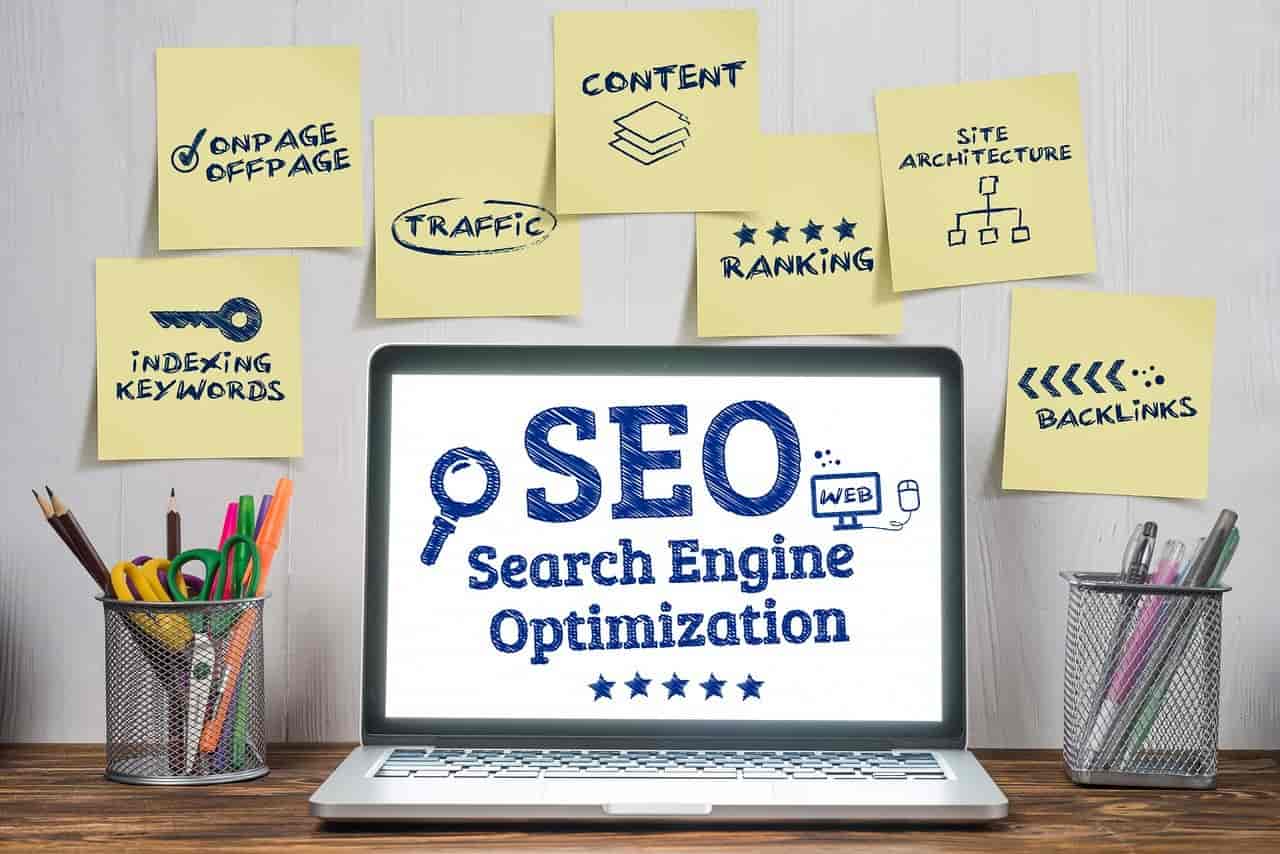The emergence of GPT-4 has revolutionized the digital marketing landscape and SEO rankings. As a content strategist, it is essential to understand how this technology impacts your approach to optimizing search engine results.
To maximize visibility and reach for relevant target audiences, an understanding of the implications of GPT-4 on SEO ranking is vital. This article will explore the impact of GPT-4 on SEO rankings and offer potential optimization strategies in light of its capabilities.
As more businesses move online, competition over web traffic intensifies, making effective SEO practices increasingly necessary for success. With new technologies such as GPT-4, marketers must remain up-to-date with the latest advancements to gain an edge against competitors.
Utilizing advances like these can help create compelling content that resonates with users while staying within Google’s guidelines for algorithm updates.
Marketers can leverage GPT-4’s natural language processing (NLP) to craft engaging copy that captures people’s attention and nudges them towards desired actions. When combined with other techniques, such as keyword research and link building, GPT-4 offers unprecedented opportunities for utilizing AI technologies to boost website performance and improve organic visibility across search engines.
By exploring these topics further, one can develop practical strategies to optimize websites using this cutting-edge technology.
Overview Of GPT-4:
The advent of GPT-4 has revolutionized the SEO landscape. This technology, developed by OpenAI, is a natural language processing algorithm that uses machine learning to generate human-like text. This powerful tool allows SEO content strategists to create a high-quality and persuasive copy in less time than ever before.
GPT-4 performs well with large datasets, allowing it to generate sentences quickly while maintaining accuracy. Its ability to learn from existing data sources makes it capable of understanding context and tone and providing accurate predictions on future search engine optimization (SEO) trends.
As such, GPT-4 offers an invaluable resource for creating compelling content that meets the needs of modern digital marketing campaigns.
This groundbreaking technology opens up new possibilities for SEO professionals looking to stay ahead of their competition.
With GPT-4’s ability to rapidly generate richly detailed content tailored specifically to a given audience, marketers have unprecedented efficiency when crafting targeted messages and optimizing keywords for optimal rankings.
The potential impact on SEO performance is clear; GPT-4 can help increase visibility among target audiences and boost overall website traffic significantly.
What Is Natural Language Processing (NLP)?
Natural Language Processing (NLP) is a branch of artificial intelligence that focuses on the interactions between computers and human languages.
NLP enables machines to understand, analyze, manipulate, and generate natural language content.
It has applications in machine translation, automated question-answering systems, text summarization, topic modeling, dialogue agents/chatbots, and more.
The use of NLP algorithms can be beneficial for SEO rankings. Using textual analysis techniques like sentiment analysis or keyword extraction can improve search engine optimization strategies by creating better-targeted content with higher relevance scores.
Its ability to process large amounts of data quickly and efficiently can help identify trends in user behavior that are not obvious from looking at raw data alone. It allows marketers to craft more effective campaigns based on customer needs and preferences.
NLP technologies can also play an essential role in identifying relevant topics for blog posts or articles, which will help increase organic traffic and website visibility on search engines.
How Does GPT-4 Affect SEO Rankings?
The impact of GPT-4 on SEO rankings is revolutionary. It has the potential to completely transform the way businesses approach their digital marketing strategies and how websites are ranked in search engine listings.
As a result, SEO professionals need to understand how this new technology works and what implications it may have for their client’s success.
GPT-4 is an artificial intelligence system that uses natural language processing (NLP) techniques to generate human-like text.
Marketers can use this text to create content that appeals to search engines and users, resulting in higher rankings and greater visibility.
Here are five ways GPT-4 could influence SEO ranking:
- Increased keyword density: NLP allows GPT-4 to recognize keywords more accurately than humans, increasing the keyword density when generating content.
- Improved readability: By understanding the context of words, GPT-4 produces more readable content that is easier for search engines to digest and rank higher in results pages.
- Fresher content: With GTP-4’s ability to rapidly generate multiple versions of similar pieces of copy, website owners can ensure their content remains fresh and up-to-date with current trends or topics.
- Automated optimization: As well as creating unique pieces of copy from scratch, GPT-4 can also take existing texts – such as blog posts – optimize them through NLP for improved performance in terms of SEO metrics like clickthrough rate (CTR).
- Enhanced user experience: Through its comprehension skills, GTP-4 helps create engaging, targeted webpages that provide a better experience for visitors while simultaneously helping boost SEO rankings.
GTP-4 offers significant advantages over manual methods when optimizing content for SEO purposes.
Its automated processes enable companies to save time and resources while still producing high-quality copy that meets all relevant criteria set out by Google algorithms.
Consequently, those who utilize this powerful AI tool will likely see long-term benefits reflected in their online presence.
Benefits Of Using GPT-4 For SEO:
GPT-4 for SEO can be a powerful tool for businesses. It has the potential to optimize content quickly and efficiently, helping businesses maintain their online presence.
By leveraging natural language processing capabilities, GPT-4 can generate high-quality content that resonates with users while still being optimized for search engines.
That helps drive organic traffic to websites, increasing visibility and overall rankings.
GPT-4 also offers more control over keyword density than manual optimization methods. It means businesses are better equipped to target specific keywords by ensuring they appear at least a certain number of times throughout the content without worrying about stuffing them in unnaturally or risking penalties from search engine algorithms.
GPT-4 enables content creators to focus on writing engaging copy rather than worrying about optimizing it manually, freeing up valuable time and resources.
Challenges When Implementing GPT-4 For SEO:
Knowing the challenges that may arise when using GPT-4 for SEO. Implementing a new technology such as this requires careful consideration and strategizing to maximize its potential while avoiding negative impacts on search engine rankings.
One challenge when implementing GPT-4 for SEO is that not all algorithm-generated content will be relevant or desirable from an SEO perspective.
As with any automated content generation, there is a risk that some generated texts may contain errors, inappropriate language, and other issues which could harm ranking performance.
It makes it essential to carefully review all generated content before publishing it online. Due to the natural language processing (NLP) complexity, understanding how specific keywords are used within a generated text can take time and effort.
To ensure the successful implementation of GPT-4 for SEO purposes, close monitoring and analysis should be conducted during the initial stages of usage to identify any underlying issues which might negatively affect rankings.
Ongoing reviews should occur periodically to measure effectiveness over time and adjust strategies accordingly.
By doing so, website owners can ensure their campaigns remain competitive regarding organic traffic acquisition without risking penalties from Google’s algorithms.
How To Optimize Content For GPT-4:
The adoption of GPT-4 by content creators has significantly impacted SEO rankings. Several vital strategies must be considered to ensure your content is optimized for GPT-4.
First and foremost, it is essential to create precise inputs. Consider the query you want to answer in response to the user’s search terms.
This information should be provided as part of an input statement which will form the basis for creating relevant output from GPT-4.
Use clear structure and formatting when providing this input so that GPT-4 can generate accurate results quickly and effectively.
It is also essential to provide an adequate context within your input statement. Highlighting any notable features or facts about the topic you are discussing helps GPT-4 craft meaningful results with improved accuracy and relevance.
Contextualizing certain elements, such as keywords or phrases, enables better indexing for search engine algorithms, thus increasing visibility for potential customers searching for related topics online.
By following these tips, content creators can optimize their material for GPT-4 while providing audiences with concise yet informative responses to their queries.
As a result, users benefit from timely access to pertinent data, while content creators receive increased exposure through enhanced SEO rankings.
Impact Of GPT-4 On Search Engine Algorithms:
It is no secret that GPT-4 has revolutionized natural language processing and content generation.
As a result, its impact on search engine algorithms has been profound. In particular, GPT-4’s ability to quickly generate high-quality content has enabled SEO marketers to make their websites more visible on search engines with incredible speed and accuracy than ever before.
At its core, GPT-4 works by learning from patterns in large datasets and then using this information to create a new text. That provides unprecedented insight into what users look for when they search online.
For example, GPT-4 can analyze user queries to determine which topics should be emphasized within webpages or blog posts to maximize visibility on search results pages. It can also identify keywords likely to attract searchers and integrate them into content accordingly.
Finally, GPT-4 can even suggest titles and other meta tags that will help boost website rankings.
In essence, the introduction of GPT-4 has transformed how SEO professionals optimize content for search engine algorithms.
Providing a comprehensive understanding of how users interact with different types of content online allows SEO marketers to craft engaging strategies explicitly tailored towards each query or topic area – empowering them to gain a competitive edge over traditional optimization methods.
Its automated nature eliminates the need for manual crafting processes, effectively allowing SEO teams to focus on producing higher quality work at scale without sacrificing any creative appeal or originality along the way:
- Increased Visibility: By utilizing insights gleaned from data sets related directly to user behavior, GPT-4 enables SEO marketers to tailor their webpages according to popular keyword trends and topics pertinent to specific industries — ensuring maximum visibility amongst target audiences while simultaneously helping sites rank higher in SERPs (Search Engine Results Pages).
- Streamlined Processes: Since GPT-4 automates much of the process behind writing content optimized for search engines, it saves time and money compared to traditional approaches — freeing up marketing resources toward more pressing priorities such as developing strategic campaigns or creating unique visuals/videos instead.
- Improved Quality: Last but not least, since GPT-4 relies heavily upon pattern recognition within existing data sets — thus resulting in highly accurate predictions about future user behaviors — it helps ensure that all produced content is both relevant and topically diverse enough to gain traction among wider audiences; ultimately culminating in improved overall engagement rates across digital platforms.
Potential Business Implications Of Gpt-4 Usage:
The potential business implications of GPT-4 usage are vast and varied. For example, businesses can use the tool to optimize their SEO rankings by automatically generating keyword-optimized content tailored to their target audience.
GPT-4 may help marketers create more personalized customer experiences, allowing them to generate real-time custom responses.
Businesses could utilize GPT-4’s natural language processing capabilities for sentiment analysis or other automated research tasks.
Ultimately, businesses should consider incorporating GPT-4 into their marketing strategies to stay competitive in today’s digital landscape.
By leveraging the technology’s artificial intelligence capabilities, companies can save time and resources while better understanding what makes customers tick.
This knowledge can then be used to craft effective campaigns and tailor products or services accordingly – all to drive higher ROI and tremendous success down the line.
Best Practices For Using Gpt-4 In Seo Strategies:
With the emergence of GPT-4, SEO content strategists are presented with a unique opportunity to leverage this powerful artificial intelligence technology to drive search engine rankings.
When appropriately used, GPT-4 can be leveraged to create high-quality, engaging content optimized for natural language processing (NLP).
However, it is crucial to understand the potential implications of using GPT-4 for SEO purposes before implementing any strategies.
Several best practices must be considered to ensure the successful implementation of GPT-4 into SEO strategies.
First, taking advantage of the NLP capabilities is important by designing keyword queries based on specific user intent. It will help ensure relevant results when searching for related topics or phrases.
Because GPT-4 does not have a human understanding of context or emotion, content should be edited accordingly before publishing.
Finally, one must also remain aware that algorithms may change over time and thus adjust their strategy accordingly; staying ahead of these changes is critical if success is desired in rankings.
Overall, while GPT-4 presents an exciting new avenue through which SEO strategists can create compelling content quickly and efficiently, proper care must still be taken when utilizing this technology not to disrupt existing ranking algorithms or result in low-quality output.
By leveraging the NLP features available within GPT-4 and remaining abreast of algorithm updates, one can use this powerful AI tool without sacrificing quality standards or jeopardizing current standings on SERPs.
Future Developments In NLP And Seo:
The advancement of Natural Language Processing (NLP) has allowed for the creation of increasingly sophisticated algorithms.
These algorithms can understand natural language and can be used to analyze the website content to improve search engine optimization (SEO). One such algorithm is GPT-4, which OpenAI developed.
Analyzing text on a website can provide insights into how well-optimized that site is for SEO purposes and suggest improvements.
There have been various developments in NLP that could impact SEO rankings. For example, some researchers have proposed using sentiment analysis models to assess the relevance of content on websites and its potential influence on SEO ranking.
Other possible advancements include automated keyword generation techniques and more effective methods for detecting spammy links or content.
Machine learning techniques could be employed to understand user intent better when searching online and optimize web pages accordingly.
With these advancements come new challenges, such as dealing with increased competition from other sites trying to rank higher in search results pages.
It will also be important for businesses to stay up-to-date with cutting-edge technology to take advantage of all potential opportunities for improving their rankings.
Ultimately, utilizing NLP technologies effectively can help businesses gain an advantage over their competitors while providing users with relevant information tailored specifically to them.
Conclusion:
As GPT-4 continues to develop, its impact on SEO rankings will become increasingly crucial for businesses of all sizes. Natural language processing (NLP) technology can help boost search engine visibility and increase website traffic. One study found that using NLP increased organic ranking positions by an average of 20%.
Businesses should consider the advantages and challenges associated with implementing GPT-4 in their SEO strategies, such as potential changes to the algorithms used by search engines. It is also critical to use best practices when utilizing this technology, including providing clear instructions and monitoring results closely.
The future of NLP promises many opportunities for improving SEO performance while cutting costs associated with creating content and optimizing websites. As technologies evolve rapidly, businesses must stay abreast of new developments to remain competitive and maximize profits. These advancements could provide a much-needed edge over competitors in today’s digital landscape.
We are young/teen girls and boys. We enjoy our life using travel blog and outings and watching people’s lifestyle blog. We try to share our knowledge and what we are looking. We discussed with various people from our and other countries about fashion blog and health blog related knowledge sharing. We get tips and just share them.
Some of us are pure technology blog love guys and girls who share some tips about internet and business blog related. Some of my friends share knowledge on baby care , home improvement, beauty tip blog, and general knowledge. You can easily read our blogs in your free time or on Sunday and get more information with enjoying knowledgeably sharing. That’s why we called Sundaybestblog.
Share This!!

















